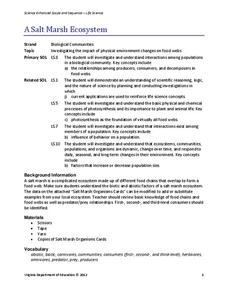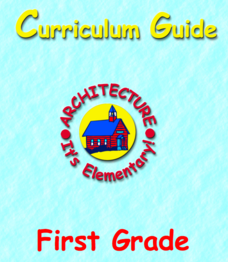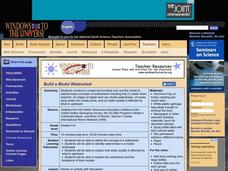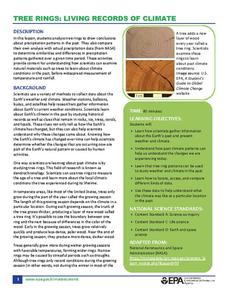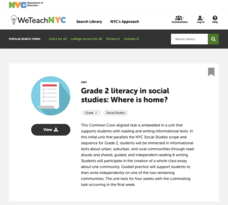Curated OER
Living Environment
In this environment worksheet students complete a series of multiple choice and short answer questions on organisms, reproduction, DNA and cell division.
Curated OER
The Differences Between Turtles and Tortoises
First graders differentiate between turtles and tortoises. In this turtles and tortoises lesson students are visited by a turtle and a tortoise. Students write a letter with an illustration after the animals visit the class.
Curated OER
Water and the Fitness of the Environment
In this environment worksheet, students answer 6 different questions. The questions are really an activity for each one. This requires extra space to complete them on separate worksheets.
Curated OER
Comparison of Snow Cover on Different Continents
Students use the Live Access Server (LAS) to form maps and a numerical text file of snow cover for each continent on a particular date and analyze the data for each map, corresponding text file to determine an estimate of snow cover for...
Constitutional Rights Foundation
The Lincoln-Douglas Debates — Springboard to the White House
The Lincoln-Douglas Debates saw two primary political candidates debating seven different times about one of the most important social movements in United States history. Middle and high schoolers read an article that describes the...
Northeast Foundation for Children, Inc.
Schedules and Routines: Grade 1
It doesn't matter if you're a new teacher trying to set up your classroom for the first time or a veteran teacher looking for new ideas to freshen up your teaching, this resource has something to offer everyone. After...
Northeast Foundation for Children, Inc.
Classroom Setup: Grade 3
There's a lot of thought that goes into setting up safe and supportive classroom environments. From establishing a whole group meeting area and arranging desks, to organizing classroom supplies and creating bulletin board displays,...
Curated OER
Land Environments
In this land environments worksheet, students will complete a table by filling in the climate, dominant plants, and characteristic animals for 6 different habitats.
Curated OER
Environment: Wild Wind Direction
Students examine the different types of wind patterns. Using common materials, they construct weather vanes to measure and record wind direction over a two-week period. After analyzing the data, they draw conclusions about the...
University of Southern California
How do Organisms Interact?
Examine how organisms interact through a hands-on experience. Learners study population dynamics and distribution during an informative five-lesson unit. The focus is on the ocean environment and the organisms within it.
Channel Islands Film
Human Impact on the Food Web of Santa Cruz Island
What happens when a non-native species is introduced onto an island? Santa Cruz Island, part of the Channel Island chain located off the coast of southern California, provides the perfect laboratory for young environmental scientists to...
K12 Reader
Competing for Resources
Young biologists examine the concept of scarce resources with a reading comprehension passage. After finishing the paragraphs, learners turn to the questions to demonstrate what they have learned about what is beneficial and what is...
Star Wars in the Classroom
Star Wars Geography Unit
What kind of animals live on an ice planet like Hoth? How would the habitat on Tatooine allow different organisms to thrive? Connect social studies, science, and Star Wars in one engaging activity that focuses on the ecosystems...
Virginia Department of Education
A Salt Marsh Ecosystem
What a web we weave. Pupils use yarn as the primary resource to create a web depicting the intricacies of a salt marsh ecosystem. They participate in a question and answer session, which leads to an in-depth facilitated discussion...
Just Health Action
Environmental Justice Matters: Mapping Environmental Justice Impacts (Part 1)
A case study of Seattle, Washington permits class members to compare and rank how different areas of Seattle are impacted by environment burdens. Groups investigate different zip codes, collect data on five categories, and color-code a...
American Institute of Architects
Architecture: It's Elementary!—First Grade
Build an interest and appreciation for architecture in your young learners with this fun 10-lesson art unit. Engaging children in using their five senses, the class first observes the environment around them, paying...
Curated OER
Build a Model Watershed
Collaborative earth science groups create a working model of a watershed. Once it has been developed, you come along and introduce a change in land use, impacting the quality of water throughout their watershed. Model making is an...
Wild BC
Is Climate Change Good for Us?
Is it really that big of a deal if the global climate undergoes a little change? Young environmentalists consider this very question as they discuss in small groups the impact of different climate change scenarios on their lives,...
US Environmental Protection Agency
Tree Rings: Living Records of Climate
Open with a discussion on weather and climate and then explain how tree rings can provide scientists with information about the earth's past climate. Pupils analyze graphics of simulated tree rings from various US locations for the...
Chicago Botanic Garden
Nature Walk and Ecosystem Introduction
A food web has no organism higher than a tertiary consumer because there wouldn't be enough energy left to sustain them. The fourth installment in a seven-part series begins with a nature walk to get pupils thinking about their...
New York City Department of Education
Grade 2 Literacy in Social Studies: Where Is Home?
What makes a community? How communities differ? Young scholars research different types of communities, small rural towns, and large crowded cities. They respond to writing prompts, and write essays in groups to understand the wide...
Curated OER
"Circles of Strength: What Do You Stand For?" ~ A Reflection of Us~
Middle schoolers determine how they are included in "Circles of Strength." In this character activity, students reflect on how they are part of "Circles of Strength" in the "Circle of Life." They make an individual circle that includes...
Michigan State University
Bug Lyphe!
Introduce ecology classes to biodiversity and interdependence in ecosystems with a PowerPoint presentation. Then, they get up-close and personal with the invertebrate world by collecting insects, classifying them, and graphing their...
It's About Time
The Changing Geography of Your Community
Lead your class in exploring their local communities as well as the general environment. As they determine continental distributions by investigating minerals, rocks, and fossils located in their local region, pupils construct...















